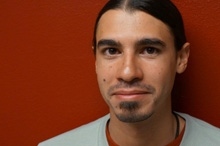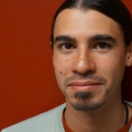

Anthony Ciocco is being honored as a Next Generation of Conservation Leaders Champion of Change.
Conservation corps: camping, hiking, sledgehammers, chainsaws, no showers, long and hard work days with little pay. It’s not a lifestyle that fits everyone. Imagine meeting a group of complete strangers, living together for 9 days at a time in the remote mountains or desert with no contact with the outside world. When it’s all over you’ll be a new person, you’ll have grown, and forged the type of deep meaningful relationships with others that can last a lifetime. That’s the real magic of conservation corps.
I came upon conservation corps somewhat by accident. I grew up loving the outdoors, but never foresaw it as a career. As a Mvskoke person deeply devoted to our traditional culture, I worked for years in various efforts to revitalize our language and traditional food systems. Overcoming generations of struggle to maintain our cultural heritage has been the most fulfilling part of my life. While I continue to passionately work in both of these fields, my motivation has evolved. I have found that real love for our community and youth means supporting them in their own endeavors. Conservation corps has offered me an ideal space for enacting this.
When I took up conservation corps work I did not realize how much it would impact the lives of my crew members, nor the impact our work would have on the environment. One of my crews worked throughout the hot Arizona summer installing induced meander structures to restore the healthy flow of a precious local stream. After 3 months of grueling labor the local wash was hit with a once-in-a-hundred-years flood wiping out most of the work we had done. We walked along the stream the following day in silence, not sure whether to cry, laugh, or just quit, assuming that all our labor was in vain. Just as all seemed lost, we noticed something was different. The flow of the stream had changed course in several areas. What the books said would take decades had just happened overnight. It had worked! The flood was a blessing, as if the stream had seen our efforts, called for rain, and utilized the surgically placed structures to flow healthy again. For the first time we saw deer tracks. The stream, the ecosystem, our faith in our efforts and in ourselves blossomed back to life.
Native Americans, as a group, rank the worst in virtually every social ill. Many crew members are high school drop outs, have endured years of child abuse, don’t know one or both of their parents, have seen a sibling or friend commit suicide, have overcome substance abuse, and very few have running water or electricity in their homes. While this could be a clichéd sob story, it doesn’t have to continue as such.
Despite the overwhelming hardships, we persist as a crew, we work, learn, and thrive. Conservation pay doesn’t lift individual members out of intergenerational poverty, it does something so much more valuable — it empowers them to lift themselves and to overcome any and every obstacle they set their minds to.
At its core, conservation work is about helping things grow. It’s an almost ridiculously simple — and simultaneously perfect — principle. The Southwest Conservation Corps Ancestral Lands Program heals our community in the broadest sense (our land base) and the most specific sense, through empowering individuals. While I have been labeled an activist, I didn’t initially consider conservation corps work to be a form of activism. However, I have found that it is perhaps the most radical form thereof, supporting and empowering our young people to fulfill their own destinies.
Anthony Ciocco, of the Mvskoke tribe, is a Crew Leader for the Southwest Conservation Corps, a 21CSC and AmeriCorps program of Conservation Legacy that is dedicated to empowering individuals to positively impact their lives, their communities and the environment. He graduated Summa Cum Laude with a Bachelor’s Degree in Ethnic Studies from University of Colorado at Boulder.


